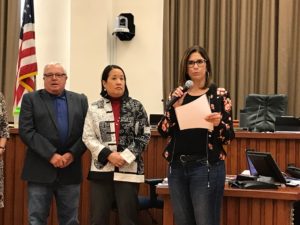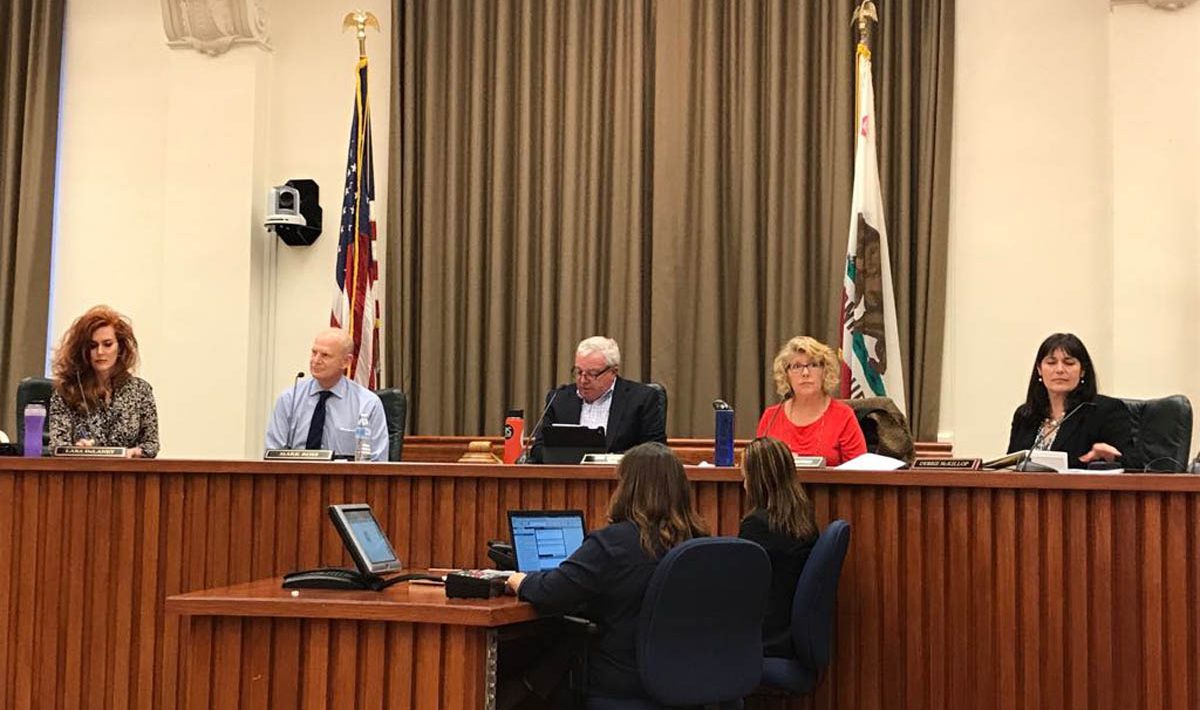MARTINEZ, Calif. – Martinez City Council, with Vice Mayor Lara DeLaney abstaining, have approved development documents Wednesday associated with DeNova Homes’ proposal to put 92 homes on the former Pine Meadow Golf Course.
The vote Wednesday night came during an extended appeal of a unanimous Planning Commission vote that also approved the mitigated negative declaration, mitigation monitoring and reporting program and vesting tentative subdivision map for the 26.77 acre property.
The development has been controversial for years, with owner Christine Dean, whose father, John Coward, built the small course, seeking to sell the property after the city’s 1976 rejection of Measure O, which would have committed Martinez to buy the land.
Dean said after that, she sought out developers who would put homes on the land instead, and preferred DeNova Homes’ proposals.
The housing contractor received approval for its earlier 99-home residential development proposal, but when opponents succeeded in requiring a public referendum on the development, the Council responded to the developer’s request and rescinded its approval Feb. 29, 2016.
DeNova Homes’ subsequent development proposal for a reduction to 92 houses on the land initially was deemed incomplete by city employees, who said the developer would need a General Plan amendment and a rezoning application to change the site’s designation from Mixed Use District-Open Space/Recreational Facilities to residential.
However, in January 2017, DeNova Homes’ attorney, Dana Tsubota, successfully argued that city documents didn’t sufficiently corroborate the staff contention and that the land was zoned instead for homes on 7,500 square foot lots. Family members supported Tsubota, telling the Council they had been paying taxes at residential zoning rates, rather than an open space designation. DeLaney cast the sole no vote.
Longtime opponents, who have formed the group Friends of Pine Meadow, have filed suit against the city, saying the Council erred when it sided with the developer’s argument, and that suit remains undecided.
Despite the Friends of Pine Meadow contention the city has “rewritten history,” the Martinez Planning Commission approved the development’s documents last month. But Mayor Rob Schroder requested a Council review of the vote, and then Tim Platt, of Friends of Pine Meadow, appealed the Commission’s decision.
The Council opened the public hearing on the matter June 1, but with DeLaney and Councilmember Mark Ross absent, overturning the appeal would have needed affirmative votes of Schroder and Councimembers Noralea Gipner and Debbie McKillop.
Gipner said she wanted to see housing on the golf course, but said she wanted a senior-age development, and said she couldn’t support DeNova’s proposal.
However, the California Housing Accountability Act, designed to encourage infill development, has been amended and strengthened effective this year, senior Assistant City Attorney Veronica Nebb said. That law requires developers to meet a city’s objective General Plan and zoning standards, not cause a significant, adverse impact to public health or take water from protected services, and meet the California Environmental Quality Act and Coastal Act standards.
If a development application meets those requirements, a municipality must approve the application and issue permits within 90 to 180 days – even sooner if a project would build affordable or government-funded homes, the act says.
It also prohibits a city from proposing changes that would reduce the number of units to be developed, or pass zoning rules effective retroactively that would make the application noncompliant. The act also forbids a city from rejecting a project for arbitrary reasons, such as whether it fits the character of an area, unless that character has been spelled out in design guidelines or zoning codes.
The 2017 amendment requires judges to award attorney fees to successful petitioners and gives judges the power to fine cities that violate the act. Tsubota told the Council the act assures developers that if they follow a city’s rules, their applications would be approved.
“It provides certainty for applicants,” Tsubota said, urging the Council to vote in accordance with the act.
She addressed Gipner’s objection, saying 7,500 square foot lots aren’t appropriate for older residents who want to downsize, nor would the houses be suitable if they wanted to avoid extensive maintenance.
However, her client has expressed a desire to create house designs that would allow for multi-generational occupation of the homes, whether letting people age in place with provisions for caretakers, or providing self-contained junior suites that could be used by older parents or adult children returning home from college.
Those specifics would be handled in preparation for design review, she said.
Platt reiterated the Friends of Pine Meadow issues with the development, including its claim the Council’s 2017 vote was a rewrite of history. Reminding the Council of the pending decision of the lawsuit, Platt said the closed golf course would remain as it is. “That’s not a good thing,” he said.
He said he thought Gipner’s suggestion of senior housing was “worthwhile,” and he denied assertions that Friends of Pine Meadow would threaten a referendum.
While Tsubota said the development would produce $75,000 per lot in fees, and schools would get $3.79 for each square foot of housing, Platt argued that those fees would simply cover the added costs to the community for the additional housing, rather than any profit to the city.
Several neighboring homeowners spoke in favor of the development, although one expressed concern that trees that might have screened neighbors from the new houses might disappear, replaced by new trees planted elsewhere.
“I want that there,” Don Wilson said, describing the golf course’s current appearance as like a dead field. He objected to a small group of residents attempting to block the development.
“I don’t want another homeless camp behind my home. We need to move on and end this,” he said.
Others echoed his statement, saying some residents who have homes in Martinez have given little care to others who also want to live here. “The real issue is they want control over the owner,” one man said. “This community was built on private property rights.”
Another homeowner concurred, and urged the Friends of Pine Meadow to stop fighting this development and instead help Martinez acquire the 300-acre Alhambra Highlands for open space preservation.
Schroder, too, asked the Friends of Pine Meadow to join in that effort. “I think it’s time to stop fighting and start cooperating on open space,” he said. Fighting over the old golf course is leading to skyrocketing legal fees, money that instead could have been spent on saving Alhambra Highlands, land that once was owned by the famed environmentalist, John Muir, who once lived here and is buried in Martinez.
McKillop concurred, saying she, too, hoped that residents would unite behind saving Alhambra Highlands. “I would like to come together as a community acquire that property….to rally around that.”
Ross had similar thoughts. He acknowledged the “yes” votes Tuesday on two open space measures, the citizen initiative that would mandate a referendum if nearly any open space land was proposed for denser development, the other proposed by the city that would exclude private property from the public vote requirement.
Not only did Ross encourage residents to back saving Alhambra Highlands, he commended DeNova for taking “green” approaches to its development that would reduce greenhouse gas emissions. “I was a progenitor of greenhouse gas thresholds,” he said, indicating he would vote for the project.
He quoted one client, who told him, “I’d rather be homeless in Martinez than in a palace anywhere else.”
One woman said if those homes become available, it would give her family the opportunity to move her mother into of the multigenerational homes, and make a five-bedroom home available to a young family.
Several people who said they long to buy a home in Martinez said they, too, liked DeNova’s proposal.
Dick Sparacino characterized opposition to the development of Pine Meadow “a witch hunt,” and said the land’s former owner sold the property to a developer who has been working with the city for years to come up with a suitable project.
However, he urged the city to complete its long-awaited revisions to its General Plan. Had it been “buttoned up, you wouldn’t be in this mess,” he said.

Scott Williams, the lead of the city’s shared homeless outreach team, said he agreed Martinez needs senior housing, but Pine Meadow golf course wasn’t the place. However, allowing the development would ease the city’s housing shortage, he said and possibly open up concentrated areas in spots more suitable for senior housing.
One older resident, Rich Verrilli, declared, “I’m a senior citizen and I have a duty to look out for younger families in our community.” He found the multigenerational design appealing, saying he’d want one of his children to buy a home in the development. “I would live downstairs,” he said.
Felix Sanchez asked whether the Mount Diablo Unified School District could accommodate additional children from the development’s residents. Tsubota said her client has obtained a mandatory letter from the District that it could.
While Gipner conceded the housing act forbids the Council from significantly modifying the application, she reminded DeNova to remember older residents when they look into further development in the city. She said she would “do what’s responsible” and vote for the development.
DeLaney said she still isn’t convinced the Council’s 2017 decision was correct, and said she would prefer to vote once the lawsuit was settled. If the courts agree with the Council, “then it’s a project I can support.” However, she abstained from casting any vote on the development’s documents.
In other matters, the Council unanimously set assessments for a dozen landscaping and lighting districts, and issued proclamations recognizing Elder and Dependent Adult Abuse Awareness and Human Trafficking Prevention and Awareness.






I ask again does Christine Dean or DeNova Homes now own this property?